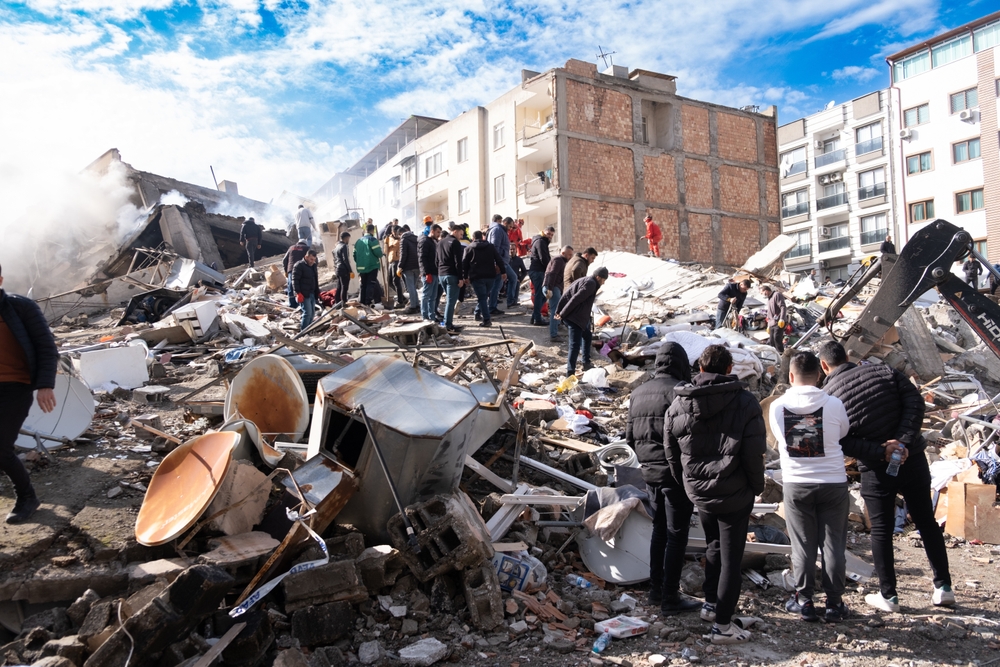On February 6th, 2023, Turkey was hit by two large earthquakes, taking the lives of over 50 thousand people and leaving 1.25 million temporarily homeless. This was followed by more than 7,500 aftershocks, making it Turkey’s largest natural disaster in over 80 years, causing $ 34.2 billion in direct damages. Not only were the earthquakes devastating for civilians, but also potentially for President Recep Tayyip Erdogan’s reelection bid. More and more criticism has surfaced regarding the delayed response from the government in regard to aid. As a result, questions have arisen about the possible impact on Erdogan’s chances of remaining in power in the upcoming elections on May 14th.
Growing frustration
This is not the first time Turkey has suffered a catastrophic earthquake. On the contrary, it is a common occurrence in the country which is located on two major fault lines. Despite this fact, some civilians in Adiyaman had to wait three days before any professional rescuers arrived on site following the earthquakes.
Anger and frustration have been growing in the country, as the government is being accused by citizens of avoiding responsibility for inadequate building standards. Professionals have reiterated this, pointing to how buildings have collapsed, and drawing the conclusion that they were not designed to provide the stability needed to withstand earthquakes of this magnitude. Harsh criticism has been raised against Erdogan from citizens in the affected regions. The combination of this along with the emergency response described as “delayed and disorganised” could be putting Erdogan at a disadvantage for the upcoming election.


On the other hand, a survey conducted at the end of February shows that the blame has shifted towards building contractors. Citizens in favour of Erdogan’s government overwhelmingly blame the contractors, limiting the loss of support for his party. Furthermore, the opposition’s failure to quickly name a candidate for the election and the lack of a concrete plan to rebuild affected regions may have hindered any rise in their support. But by now the six-party opposition alliance, the Nation Alliance, has decided on a candidate, Kemal Kilicdaroglu, thus taking the first step to end much of the uncertainty. The alliance has also gotten support from the pro-Kurdish Peoples’ Democratic party, which has decided not to run, thus indirectly pointing its voters towards the Nation Alliance.
The parallels to the 1999 earthquake
A potential reason for the rise of doubt in Erdogan’s re-election is the extensive parallels to the 1999 earthquake, which took the lives of more than 17,000 people in the area of İzmit, southeast of Istanbul. The cause of most of the casualties was the collapse of residential buildings. The government received extensive criticism, as civilians had to wait a long time for emergency teams. It was in the aftermath of this natural disaster that Erdogan came into power in 2003. His government promised stricter building regulations, more transparency and to rebuild the economy, which was experiencing a stock market crash as a result of long-running political and economic issues. Today, Erdogan is the one who is facing criticism for a delayed response, while the economy is experiencing high rates of inflation. One could therefore say that it is not unimaginable that a shift of power may occur this year.
The elections
While a shift of power after a devastating earthquake has happened before in Turkey, one cannot be sure that history will repeat itself. There are questions to be asked about the extent of the Turkish democracy itself. In other words, for the earthquakes to have a potential effect on the election, we need to know that the elections themselves are free and fair. Any potential manipulation of the 2023 presidential elections would make it much harder to evaluate the impact or effect of these earthquakes on the election outcomes and would make all of this speculation rather meaningless.


Researcher Pınar Dinç, amongst others, argues that Turkey is not at all a full democracy, rather it is a competitive authoritarian state, with a fraudulent electoral system. Much has changed since Erdogan first came to office: he has garnered more power for himself by putting the country into a state of emergency and, step by step, the democratic pillars have been torn down. This year, Erdogan is running for a third term in office, which is something that the opposition in Turkey finds unconstitutional. However, Erdogan’s supporters argue that a 2017 referendum, which changed Turkey’s political system from a parliamentary system to a presidential regime, makes a third term legal, as his 2018 term technically would be his first in this new system and should therefore count as his initial term in office.
The importance of this election cannot be understated, and it will show the true extent of the Turkish democracy. With little less than a month to the election, time is slipping away. What the outcome will be remains to be seen after the 14th of May, and only then will we see the true effects of the February earthquakes.
By Ella Målberg








